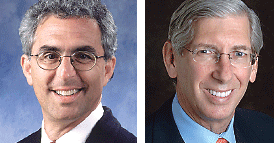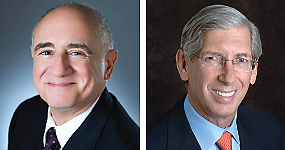APA President Jeffrey Lieberman, M.D., is using the Psychiatric News Alert as a forum to reach APA...
Study Finds Psilocybin as Effective as Escitalopram at Reducing Depression Over Six Weeks

The psychedelic psilocybin may have antidepressant effects comparable to escitalopram, according to a small clinical study published in the New England Journal of Medicine. In a six-week, randomized trial, adults with a long history of depression who took psilocybin experienced similar reductions in depressive symptoms and similar levels of side effects as those taking escitalopram.
Robin Carhart-Harris, Ph.D., of Imperial College London and colleagues recruited 59 adults aged 18 to 80 with moderate or severe depression (at least a score of 17 on the Hamilton Depression Rating Scale); many participants had chronic depression, and the average duration of illness was about 18 years. The participants were assigned to receive either 25 mg of psilocybin (taken one day after enrollment and again three weeks later) along with daily placebo capsules or 1 mg of psilocybin on the same schedule along with daily escitalopram (10 mg/day for the first three weeks and 20 mg/day for the next three weeks). All the participants received psychological counseling sessions one day after taking psilocybin.
The primary outcome measure was improvement in depression symptoms as assessed by the Quick Inventory of Depressive Symptomatology–Self-Report (QIDS-SR-16).
After six weeks, participants in both groups reported statistically similar improvements in their depression symptoms; average QIDS-SR-16 scores decreased by 8 points in the psilocybin group and 6 points in the escitalopram group. A greater percentage of participants taking psilocybin experienced a clinical response (a drop in their QIDS-SR-16 scores of more than 50%) than those taking escitalopram (70% in the psilocybin group vs. 48% in the escitalopram group). In addition, more participants taking psilocybin achieved remission (QIDS-SR-16 score of ≤5) than those taking escitalopram (57% vs. 28%, respectively).
“A limitation of the trial is the brief duration of escitalopram treatment, because this drug has a delayed therapeutic action on depression,” Carhart-Harris and colleagues wrote. “Had the course of escitalopram been extended, it is possible that better efficacy would have been observed among the patients in the escitalopram group.” Carhart-Harris and colleagues also cautioned that most of the participants volunteered because of an interest in psychedelic medicine, which may limit how applicable the findings are to a broader population.
“Although this trial is an evidentiary milestone in the development of psychedelic drugs, it also reveals major knowledge gaps,” wrote Jeffrey A. Lieberman, M.D., of Columbia University Vagelos College of Physicians and Surgeons and New York State Psychiatric Institute, in an accompanying editorial.
Lieberman, a former president of APA and psychopharmacology expert, noted that researchers do not know how psychedelics produce their mind-altering effects or if a patient needs to have a mystical experience following psychedelic ingestion to get a therapeutic effect. “The Carhart-Harris study notwithstanding, we are still awaiting definitive proof of the therapeutic efficacy of psychedelics and their capacity to improve the human condition.”
To read more on this topic, see the Psychiatric News articles “The Return of Psychedelics: Still Time to Prevent Tragedy,” by Stanley Caroff, M.D., and “The Return of Psychedelics: A Measured Approach,” by Charles Grob, M.D. APA’s 2021 Annual Meeting will also feature a session on psychedelics; a preview can be found here.
(Image: iStock/Pornpak Khunatorn)
Members Invited to Apply for New Presidential Task Force on Social Determinants of MH
APA members are invited to apply for appointment to the new Task Force on the Social Determinants of Mental Health, which reflects the theme of incoming APA President Vivian Pender, M.D. There will also be eight work groups that will address major issues related to social determinants of mental health. The appointments begin on May 3 and end at the close of the 2022 Annual Meeting. Those interested should submit a CV, brief summary of expertise, and specific area of interest to TFSDOMH@psych.org by April 26.
Don't miss out! To learn about newly posted articles in Psychiatric News, please sign up here.






